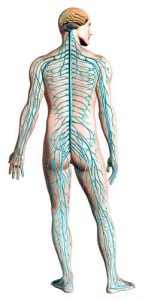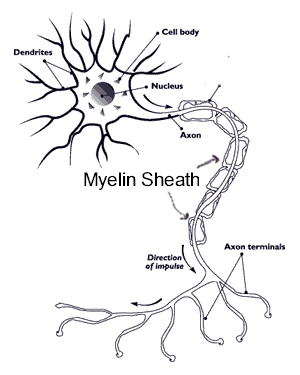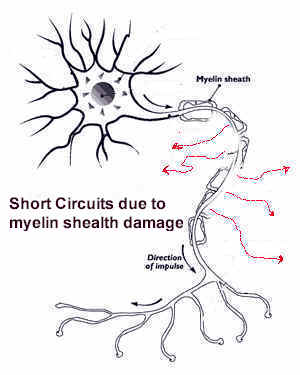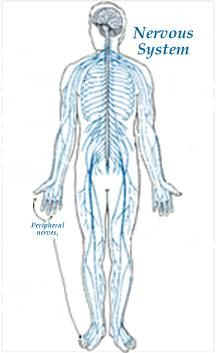Neuropathy (nerve damage) the cause and its relief
GET EDUCATED TO TAKE CONTROL OF YOUR HEALTH
What is neuropathy pain? What creates the nerve pain, tingling, numbness, burning, etc. known as neuropathy? What you can do to get relief from the symptoms of neuropathy no matter what the cause?
1) What is Neuropathy?
2) Types of Nerves that can be damaged
3) What causes nerve damage
4) Other terms for neuropathy
5) What are neuropathy Symptoms
6) Treatments for Neuropathic Pain
7) Neuropathy Treatments find what natural vitamins to take to relieve neuropathy pain, numbness and tingling by building healthy nerves
 What is neuropathy?
What is neuropathy?
How does it happen?
The word neuropathy is derived from two parts: “neuro” referring to the nerve and “pathy” indicating disorder.
Peripheral neuropathy is a condition occurring when injury or disease damages your peripheral nervous system. The peripheral nerves are the nerves that originate from your brain and spinal cord, and extend to your skin, muscles and tissues.
The peripheral nervous system relays information between your body and the brain in the form of electrical impulses. Each nerve is made up of many connected cells called neurons that transmit these impulses.
Nerves are the communication lines of the body. Electrical signals from the brain travel through the nerves and give instructions to the various body parts. The body receives information from the environment through the senses and sends this information to the brain via the nerves.
However, damage to the nerves disrupts this which results in the condition called peripheral neuropathy and its various symptoms.
The types of nervesThere are three types of peripheral nerves – the first is motor nerves which regulate the movements of your body’s muscles, the second is sensory nerves which transmit sensations such as heat, vibration, touch and pain to the brain. The third is the autonomic nerves which regulate the activities of the internal organs and glands.
The majority of the peripheral nerves are responsible for sensations you feel such as touch, pain and temperature. There are literally millions of these nerve endings in your fingers, hands, toes and feet which are designed to keep you out of danger and away from the things that are hot, cold, sharp, etc.
These nerves to the muscles of the hands and feet, legs and arms (called motor nerves) help to control the numerous muscles and movements in these regions of the body. It would also be difficult to walk without knowing what your feet are standing on or to pick things up if you had no idea how hard you were gripping something. It would be difficult to move if the impulses weren’t transmitted to the muscles.
The nerves to the autonomic system are not under conscious control but respond to the environment so the body can function optimally. It controls such tasks as controlling the bladder, slowing down or speeding up the heart rate, constricting or dilating the pupils of the eye. It regulates blood pressure, sexual response and many other responses.
Peripheral nerve cells have three main parts: cell body, axons, and dendrites (or terminal).. (See diagram below)

Damage to the nerves
Nerve damage or neuropathy normally occurs when the outer sheathing or the myelin (protective covering) of nerve cells degenerate. Without this protection the electrical signals are not transferred properly just like if you stripped the covering off of the electrical wires in your house.
As the nerve damage gets worse, the nerves either lose their ability to transmit information (numbness), or they start sending false signals (pain and tingling).
When the insulation begins to crumble, the unprotected “wire” will start short-circuiting.

When the signal cannot be sent through the nerve, the area not receiving the messages will result in numbness.
Neuropathy is the condition where the nerves have sustained enough damage that there is noticeable numbness, pain or tingling.
Reference: US National Library of Medicine – NCBI – National for Biotechnology Information – Neuropathic Pain
How can you tell its neuropathy and not muscle or joint pain?
Difference between nerve pain and muscle pain:
Muscle pain is preceded by trauma or injury, while nerve pain doesn’t (It can come from known trauma but not always).
Muscle pain is an ache or pain in the muscle or joint, it feels achy and there can be stiffness, nerve pain or burning, stabbing and tingling.
Muscle pain stops after healing of the injury takes place; Nerve pain continues.
Muscle and joint pain can be relieved with aspirin or other pain killers; The same medication does not help nerve pain.
Types of Nerves that can be Damaged
Cranial: Nerves go from your brain to your eyes, mouth, ears and other parts of your head.
Peripheral: Nerves go from your spinal cord to your arms, hands, legs and feet. This is the most common form of damage.
Central Nerves are in your brain and spinal cord.
Autonomic: Nerves go from your spinal cord to your lungs, heart, stomach, intestines, bladder and sex organs. Damage to these nerves can create improper functioning of these organs.
Types of Neuropathy
There are three types: Mono Neuropathy, Poly Neuropathy and Autonomic Neuropathy or nerve damage.
Damage to a single nerve is called mononeuropathy. This usually results from injury or repeated stress. An example is carpal tunnel syndrome. The repeated impact to the nerve in your wrist may cause tingling, pain and weakness in your hand, arm, and shoulder.
Involvement of multiple nerves called polyneuropathy is common. Damage typically begins in the nerves farthest from the central nervous system. Polyneuropathy can be caused by diabetes and other systemic diseases, infections, or exposure to toxic substances.
One or all the three nerve types may be affected. Polyneuropathy can be due to damage to sensory nerves, and can also cause damage to your motor nerves which can result in muscle weakness lack of coordination, twitching and pain.
A common sign of autonomic neuropathy is nerve damage to the internal organs and glands and can include intolerance to heat, loss of bladder control, gastrointestinal disturbances, impairment of breathing and impairment of heart rate.
Most commonly, it is diabetics that suffer from this type of nerve pain and it is a major complication of the disease. It is the higher than normal sugar levels that creates the damage.
However, there are many other reasons some of which are listed below (alphabetically). It is an acquired disease.
- Alcoholism
- Amyloidosis (metabolic disorder)
- Autoimmune disorders
- Bell’s Palsy
- Cancer
- Cancer treatments
- Carpal tunnel syndrome
- Charcot Marie-Tooth disease
- Chemotherapy Treatment (See Chemo-Induced Side effects for other side effects)) See Chemotherapy Induced Peripheral Neuropathy
- Chronic kidney failure
- Compression neuropathy – pressure on an area
- Connective tissue disease (e.g., rheumatoid arthritis, lupus, sarcoidosis)
- Diabetes mellitus
- Foods that are toxic
- Herniated disc
- Infectious disease (e.g., Lyme disease, HIV/AIDS, hepatitis B, leprosy)
- Liver failure
- Many medications (such as Lyrica, Cymbalta, Duloxetine hydrochloride, Pregabalin, and more. See Neuropathy as a Side Effect)
- Radiation Treatment
- Radiculopathy
- Surgeries that damage a nerve
- Trauma
- Vitamin deficiencies (e.g., pernicious anemia, etc.)
- Zinc induced copper deficiency (denture adhesive creams)
and more
See Factors that can Cause Neuropathy or Nerve Damage
The sad fact is that after a while this misfiring of the nerves can get so bad that people are unable to walk or pick things up and can get to a point where they would rather have a limb amputated then continue with this nerve pain.
For articles about specific Causes of Neuropathy, click here
How does this happen?
Chronic Neuropathy can start when your nerves are deprived of oxygen (anoxia). But there are many reasons why this might happen, and it is sometimes a combination of reasons. One reason might not be enough to notice but add a second and it can be very pronounced.
Symptoms can be progressive, which means they worsen and spread to different parts of the body over time. This is particularly true for those with diabetes or other conditions that continuously inflict damage to the nerves.
- too much sugar or insulin in your blood (diabetes), and also in pre-diabetes or insulin resistance]
- The use of many medications (a list can be found here Medications with Neuropathy as a Side Effect)
- Nutritional deficiencies (B1, B12, etc.)
- Exposure to toxic substances (ingested in food, drugs, chemicals, water or pollution)
- Radiation therapy for cancer,
- Chemo therapy for cancer
- Lying in one position too long (nerve compression, entrapment or laceration)
- Physical injuries (trauma) to the nerve
- Injury from a surgery.
- Prolonged compression as in the wearing of inappropriate footwear, skinny jeans, etc.
- Infections that can block oxygen getting to your nerve cells.
Too many free radicals in your bloodstream can also attach themselves to the oxygen and make it unavailable to the cells. Sometimes inflammation in the lower back or sciatic nerve area of the buttocks can restrict blood flow, depriving oxygen to the nerves.
Common drugs like statins (to reduce cholesterol) can eat away the myelin sheath – which is composed mostly of cholesterol. Statins are designed to lower the cholesterol which is what the body needs to maintain the myelin sheath around the nerve. See also Neuropathy & Statins
High blood pressure medication can cause neuropathy by decreasing blood flow at the extremities, like the feet or hands.
Drugs create side effects by depleting the body of different nutrients that the body needs. This deficiency can cause various problems including nerve damage. See also Drugs and Deficiencies
B Vitamin Depletion and Neuropathy:
Certain artificial stimulants, such as cigarettes and alcohol, are known to aggravate the neuropathy condition. Both of these work to slow blood flow throughout the body. In the process, less nutrients and oxygen are being delivered. This is the last thing that you want if you have neuropathy.
Anything that uses up B vitamins in the body (depletes these vitamins) will make the condition worse. The body needs the B vitamins for healthy nerves, if these B vitamins are being used up by alcohol metabolism, sugar, caffeine, stress, etc. the nerves will be less able to do their job and then will become more damaged.
Other terms for Neuropathy
 This is valuable when you are checking your medications to see if neuropathy is a possible side effect. The manufacturer doesn’t always list it as neuropathy. You should talk to your doctor about the possibility of changing your medications.
This is valuable when you are checking your medications to see if neuropathy is a possible side effect. The manufacturer doesn’t always list it as neuropathy. You should talk to your doctor about the possibility of changing your medications.
- Nerve Damage
- Paresthesia or paranesthesia
- HSAN1 – Hereditary sensory and autonomic neuropathy
- HSN1 – Hereditary sensory neuropathy
- Neuralgia
- “Numbness & tingling” or “pins and needles”
- “Poor balance of nerve damage” – Ataxia
- Formication – a sensation that resembles that of insects crawling (tactile hallucination) on (or under) the skin
- Demyelinating Syndrome
- Chronic Inflammatory Demyelinating Polyneuropathy (CIDP)
- Radiculoplexus neuropathy
Neuropathy Symptoms
More than 100 types of neuropathy pain have been identified, each with its own development, and impaired function. You can get nerve damage in any part of our body. It depends on what nerve is damaged. It can be your hands, feet, arms legs, head, face, stomach, bladder, etc. etc.
These symptoms or nerve damage or neuropathy are often slight at first. In fact, some mild cases may go unnoticed for a long time
These symptoms depend on the type of nerve – motor, sensory or autonomic – that are damaged.
Peripheral Sensory Neuropathy symptoms
Some people may experience numbness, tingling and pricking sensations, sensitivity to touch and even left arm pain and tingling. Small fiber neuropathy affects the nerve endings in the fingers or toes as well as the legs. If the nerve damage increases it can cause numbness. This can lead to numbness in feet and other areas.
Others may suffer more extreme symptoms, including burning pain (especially at night) and stabbing pain.
Numbness, pain or tingling in the feet and ankles or legs may, after several years, lead to weakness in the muscles of the feet as well. The loss of sensation in the feet may increase the possibility for foot injuries to get unnoticed and develop into ulcers or lesions that become infected, not to mention having trouble with coordination.
Motor Nerve Damage symptoms
Damage to motor nerves can result not only in lack of coordination and muscle wasting and even paralysis.
Nerves to the body’s organs symptoms
Nerve damage to the nerves that serve the body’s organs can cause organ or gland dysfunction. This type of damage can create organs functioning inadequately. It can affect the heart rate, it can create erectile dysfunction, digestion, breathing, etc. etc.
Diabetic Neuropathy
Diabetic Neuropathy can flare up suddenly and affect specific nerves. This can develop double vision or dropping eyelids, or weakness and atrophy of the thigh muscles. Nerve damage caused by diabetes generally occurs over a period of years and may lead to problems with the digestive tract and sexual organs, which can cause indigestion, diarrhea or constipation, dizziness, bladder infections and erectile dysfunction.
Chemotherapy Caused Neuropathy
Neuropathy as a side effect of chemotherapy can cause these same symptoms can create a lack of coordination due to the motor nerves being affected and may even cause chemo-brain as there is evidence that this could be due, in part to nerve damage.
See Chemotherapy Induced Neuropathy
Peripheral Neuropathy affects at least 20 million people in the United States alone and per some reports is increasing.
Treatments for Neuropathy Pain & Other Symptoms
Remedies for Neuropathy
You’ve probably read or heard about lots of different remedies for the symptoms of nerve damage (neuropathy). You just need to search on the internet under neuropathy to get pages and pages of remedies. The search will reveal many different viewpoints about what will help you get relief. I’ve talked to many people who have tried remedy after remedy.
There are many herbs that attempt to cover up the symptoms and there are many drugs that try to cover up the symptoms.
There are many different anti-oxidants and formulas that will bring some relief. I know the things that will help – essential fatty acids, vitamin c, combination of acetyl l-carnitine and alpha lipoic acid – etc. etc.
You can go to Neuropathy Treatments to get the pros and cons of many of these.
The real cause of all these problems however is the unhealthy nerves. Healthy nerves aren’t painful, they aren’t numb, don’t burn…. and don’t have any of the other symptoms of nerve damage…..and aren’t all the other symptoms that you feel with nerve damage.
GET YOUR QUALITY OF LIFE BACK
What can you do?
Take a Quiz: Am I doing everything I can to daily help my neuropathy?
Find out what lifestyle changes will help, take the quiz and get an evaluation and our recommendations on what you can do for your neuropathy.
Take Our Quiz
Restoring Health to the Nervea
We always recommend you take the approach of building health and nerves are no different.
The Healthier your nerves are, the less the symptoms of nerve damage you will feel.
Nerves need to be healthy to function properly.
Pros: Healthy sensory nerves mean that they are not painful. Healthy nerves mean that they communicate and don’t send wrong signals such as burning, hot and cold, tingling when there is no reason for it. Healthy motor nerves mean that they relay messages from the brain to the muscle so that they move correctly without weakness.
The body needs specific nutrients (vitamins) to be able to build healthy nerves. Getting bio-available special forms of B1 and B12 along with the other B Vitamins that activate them will promote and support healthy nerves.
Cons: It may not give immediate relief as the vitamins are working at a cellular level, it may take longer, but it does address the actual problem and builds healthy nerves.
Building Healthy Nerves: Find out what is needed to restore health to the nerves.
(For temporary relief while building healthy nerves, go to Pain Relief Formula)
Natural Treatment & Building Healthy Nerves
The body needs the correct tools to restore health and build healthy nerves. These tools are specific nutrition (vitamins). Healthy nerves aren’t painful, they aren’t numb, don’t burn…. and don’t have any of the other symptoms of nerve damage.
What are they? Read on.
It has been known for some time that B1 (thiamine) is very effective. It is needed by the body to create healthy nerves.
Unfortunately, the oral intake of vitamin B1 does not greatly increase the levels of B1 in the blood stream.
The reason for this is that Thiamine, like all of the B vitamins, is water-soluble. Thiamine cannot be stored in the body and flushes out within 4 to 5 hours.
Additionally, it has been found the symptoms are made worse by insufficient amounts of B12 in the body. Vitamin B12 supports the sheathing that protects nerve cells and has shown in studies to promote the growth of healthy nerve cells.
In the past, it has been difficult to remedy the B12 deficiency. The reason for this is that while vitamin B12 is readily stored by the body, it is not readily absorbed by the body. For this reason much larger amounts have been used in supplementation, but even large oral dosages have not been an adequate solution.
Keep reading. There is a solution.
A Remedy for this Problem
You might have heard of the new type of vitamin B1 being produced, called Benfotiamine. It is a fat-soluble version of vitamin B1. What does this mean? It means this new form of vitamin B1 can be taken orally in large dosages and it will not flush out of the body the way ordinary Thiamine (vitamin B1) does. This is due to the fact that this type of B1 will be delivered into the blood stream where it can travel to the cells and be used.
Also available is Methylcobalamine (called Methyl B12). This is the form of vitamin B12 that can be directly utilized by the body. When regular B12 is taken, the body has to convert it into the Methyl B12 in the gut. Methyl B12 already comes in this useable form.
Where can I find these supplements?
RECOMMENDED: (This is where we have researched products and found one that we found will work for you.)
We have been recommending this formula for 16 year. We have looked at other products that had similar ingredients, but haven’t found one that has all the necessary ingredients.
***The name of the product is Dr. Berg’s Nerve Support with Benfotiamine
It contains both the Benfotiamine and Methyl B12. The result is that the blood stream levels of vitamin B1 and vitamin B12 can be greatly increased, providing the nutritional support needed by the body to rapidly and far more effectively to decrease or eliminate the symptoms of unhealthy nerves.
Both Benfotiamine and Methyl B12 have been shown to be non-toxic and without any side effects even in very high dosages.
Additionally, the formula has three other B vitamins and vitamin D3 in the exact proportion that work together to produce the best results. The formula has been found to be exactly what the body needs.
Why the other B vitamins in the formula?
B1 (thiamine) is dependent on the other B-complex vitamins. Absorption of B1 into the body requires adequate supplies of vitamin B6, B12 and B9 (folate). A deficiency in Vitamins B12 can increase loss of B1 in the urine, and vitamin B6 also appears to help regulate distribution of thiamine throughout the body. B9 (folate) is also necessary to activate the absorption of the B12. The body utilizes vitamin B2 to keep tissue healthy and to help accelerate healing of injuries. B2 protects the nervous system.
The B9 in this formula is in the form of folate which is the natural version of B9 as found in food. Folic Acid is a synthesized version of vitamin B9 that is added to processed foods and the common version used in supplements.
In addition the formula has Vitamin D. One of the functions of Vitamin D is the regulation of nervous system development and function.
It also has magnesium and alpha lipoic acid.
How do these vitamins support nerve health? Read about Healthy Nerves
(Based on Science)
What else does this formula have?
Magnesium – It is a crucial mineral for the transmission of signals between your neurons. It also plays a role in neuromuscular conduction, which is the process that allows your central nervous system to control muscle movement. Additionally, magnesium helps protect against brain atrophy caused by neuronal loss.
Alpha-lipoic acid (ALA) – ALA is a highly potent antioxidant that has the power to neutralize free radicals known to cause nerve pain. This unique compound can also stimulate nerves and regenerate damaged nerve fibers.
Support for Your Success:
We want to make sure that you get the results you are seeking. You can always email or call 818 252-1038
We don’t just want you to buy a vitamin and hope it works. We want to make sure that you know how to take it and anything that might cause a slowdown in restoring nerve health.
Sounds too good to be true? This formula has a very high success rate with lots of testimonials. See below.
The Nerve Support Formula is made at an “FDA Inspected Facility” and cGMP labs (Good Manufacturing Practice Facility). This means it adheres to Good Manufacturing Practices for supplement manufacturers. This process guarantees the potency, purity and quality of this product.
Made in the USA. Gluten free.
You can get more information about the Nerve Support with Benfotiamine – A Formula by Dr. Berg
STILL HAVE QUESTIONS? CALL 818 252-1038 OR EMAIL AND GET YOUR QUESTIONS ANSWERED
Ready to Restore Health to Your Nerves?
Order the Nerve Support with Benfotiamine – a Formula for Dr. Berg Get Your Quality of Life back
Sign up to receive the MCVitamins Newsletter!
Up-to-date info on the latest health-related news happening in the world
(available in English only)

